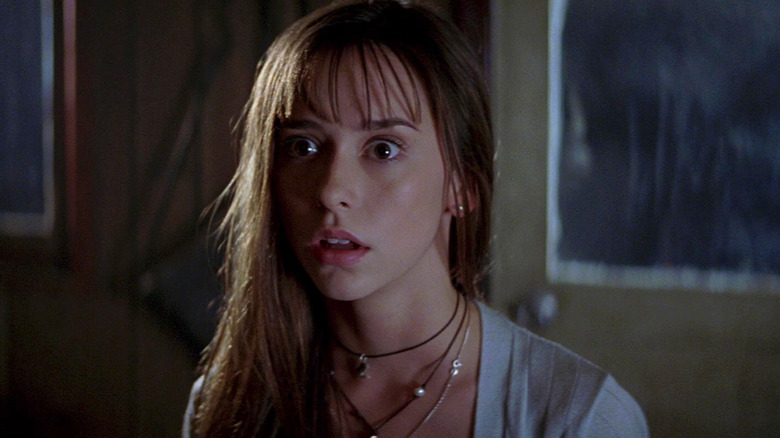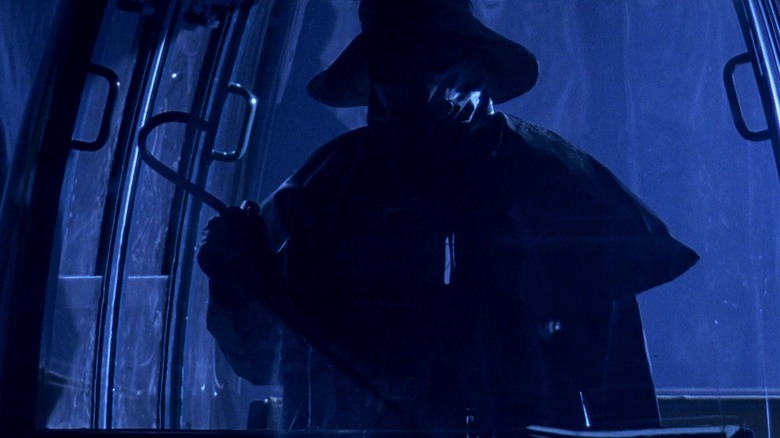An Unmade I Know What You Did Last Summer Sequel Could Have Changed The Franchise Completely
Given the juggernaut that the "Scream" franchise became, it feels like that property is the obvious and uncontested champion of the wave of teen horror films that it spawned. Not so fast, Ghostface — while other contenders like the "Urban Legend" and "Dracula 2000" movies petered out long ago, the Fisherman manages to keep coming back for more.
That's right: Another Kevin Williamson-penned horror film, 1997's "I Know What You Did Last Summer" has spawned two sequels, a reboot series in 2021, and a legacy sequel due out in 2025 (at the time of writing). While that's not yet enough to rival "Scream," it's impressive that the franchise is far from dead, especially considering how many bizarre twists and turns the property's continuity has taken over its relatively short lifespan. The central hook of the first film — a group of teens cause and then cover up an accidental death, only to find themselves being menaced by someone who knows their secret a year later — is undeniably a powerful one (a premise that Williamson adapted from the 1973 Lois Duncan novel of the same name). Yet, a cursory glance at the franchise is all one needs to realize that the sequels could've gone any number of ways.
To that end, filmmaker Mike Mendez (a veteran of B-movies like "The Convent" and "Big Ass Spider!") told Bloody Disgusting in 2022 that, following the original film's success, he was invited to pitch his take for an "I Know What You Did Last Summer" follow-up. Columbia Pictures was clearly eager to capitalize on the first movie's popularity, seeing as "I Still Know What You Did Last Summer" — the sequel the studio eventually wound up making — came out almost exactly one year after its precursor in November of 1998. Directed by Danny Cannon and written by Trey Callaway, the film followed Jennifer Love Hewitt's Julie (one of the two survivors of the first movie) as she's tormented by a not-quite-dead Fisherman (Muse Watson) and his son (Matthew Settle) at a remote resort in the Bahamas.
Had Mendez gotten the chance to make a sequel based on his pitch, however, it could've taken the franchise in a completely different and unique direction.
Mendez used the two killers idea cleverly in his Last Summer sequel pitch
As Mendez described it, his pitch for a "Last Summer" sequel would not have involved the Bahamas (or Jack Black's unfortunate dreadlocks) at all, but would've picked up on the first film's ending by setting the entire movie at Julie's college. It also would've elaborated on the original movie's hints at Julie's boyfriend, Ray (Freddie Prinze Jr.), potentially being a killer. The implication is something which the first film only uses as a red herring, but Mendez thought it could be used again in earnest thanks to a certain line Ray has in the original movie:
"From what I remember, my concept was basically this: Jennifer Love Hewitt's character went off to college. It was playing off of that thing that Freddie Prinze Jr. says to her in the first movie, something like 'I'll always be there, I'll always be watching over you,' something like that. It's actually kind of creepy, the way he says it."
As the movie Mendez pitched would've continued, Julie would be threatened as the killings started up again, and it wouldn't be clear whether it was Watson's Fisherman (aka Ben Willis) or Prinze Jr.'s Ray behind the murders. When the eventual unmasking would occur, Mendez planned on utilizing Williamson's shock twist of two Ghostface killers from the first "Scream" in a novel way — by revealing that Ben and Ray had both been murdering people in their pursuit of Julie, but without being on the same side. As he explained it:
"So there are two Fisherman killers that are both trying to kill Julie ... It ends in kind of an homage to 'Child's Play 3,' in a big funhouse with both killers trying to get her. But they also hate each other, so the killers would be popping up, trying to fight each other, as well as still trying to get her. I wanted to make it a big, zany setpiece that had lots of scares."
Although the actual "Last Summer" sequel ended up with the reveal of two killers instead of one, it did so in typical "Scream" fashion, wherein the killers were related to each other and their interests were aligned. By the sound of it, Mendez's pitch was more of an "Alien vs. Predator" situation that had Final Girl Julie getting caught between two murderers who weren't working as a team — a concept which still feels pretty unconventional today.
The Last Summer franchise did end up going in a pretty unique direction regardless
Although Mendez's recollection of "I Know What You Did Last Summer" and "Scream" was a bit inaccurate (he referred to them as bloodless PG-13 films, two things that are not true), the general perception of both franchises tends to align with Mendez's, i.e. that they're "poppy, glossy kind of modernizations" of old-school slashers. While both properties undeniably sport a hip, populist approach, in actuality they have more bite to them than one might expect. Where "Scream" goes deep into themes of life imitating art, generational trauma and the origins of toxic behavior, the "Last Summer" franchise is effectively the "Friday the 13th" to that film's "Halloween," leaning on the theme of guilt and a curse that can never be broken. To wit: neither of the first two "Last Summer" movies has a definitive ending, as Julie appears to be attacked by the Fisherman in ways that could either be real or simply be her deep seated guilt and paranoia torturing her.
With the third film in the property, 2006's "I'll Always Know What You Did Last Summer," all bets were officially off. That's because the movie disposed with the prior two entries' pretense of verisimilitude and went ahead and made the Fisherman a fully supernatural entity. Similarly, where the first two films involved the human Ben Willis being able to pull off some fairly elaborate pranks and set-ups for his victims, the third "Last Summer" installment never has to justify the Fisherman's abilities. It is, to continue the "Friday the 13th" comparison, the "Friday the 13th Part VI: Jason Lives" of the "Last Summer" franchise, i.e. the entry where the property stops playing coy with stretching credulity and dives headfirst into the paranormal. Although the direct-to-video title is only loosely connected to the first two movies, it does feel like a pivoting of the franchise's lore rather than a full-on reboot.
A reboot may indeed be the ethos behind the 2025 "Last Summer" sequel, which seems to be a direct sequel to solely the first two "Last Summer" films (a la 1998's "Halloween H20"). While it's unfortunate the idea of a supernatural Fisherman seems to be getting shelved, the fact that it happened at all — along with Mendez's old pitch — indicates that the Fisherman may yet prove to have more tricks and surprises up his hook-handed sleeve.


